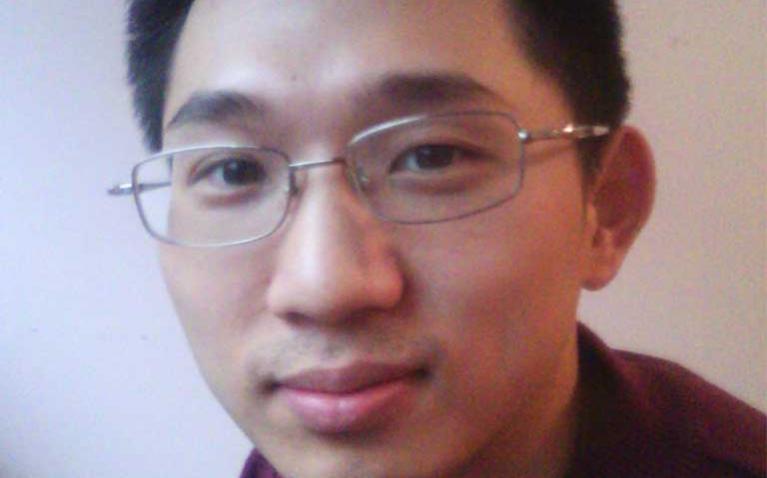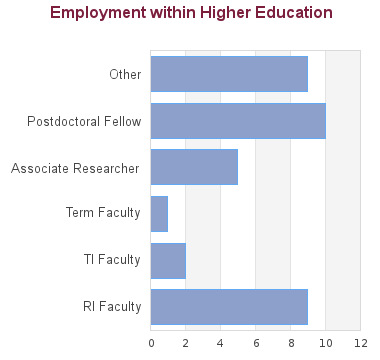
Xin Ye
Job Title
Research Scientist
Employer
Arbutus Biopharma Inc.

Review details about the recently announced changes to study and work permits that apply to master’s and doctoral degree students. Read more
The UBC Department of Pathology and Laboratory Medicine offers a remarkable opportunity to study with numerous world renowned faculty and research programs. We are recognized as national and international leaders in both basic and clinical research. Experimental Pathology refers to research in any area of biomedical investigation that is relevant to human disease. Since it is necessary to understand the normal working of the system to fully define the changes associated with disease, the areas represented at UBC cover a wide range of fields and approaches. Work at all levels of biological organization is involved, from protein to lipoprotein biochemistry and molecular biology through cell and tumour biology, animal models for studies on pulmonary and cardiovascular pathophysiology and viral and bacterial infection processes, to clinical studies on human population and the AIDS epidemic.
We train students with varied backgrounds in science and medicine including: biochemistry, physiology, cell biology and microbiology/immunology.
We are committed to effective, cutting-edge, ethical research. The results of which will reach beyond the academic realm to effect positive change in the lives of our families, communities and, ultimately, our world.
The Faculty of Graduate and Postdoctoral Studies establishes the minimum admission requirements common to all applicants, usually a minimum overall average in the B+ range (76% at UBC). The graduate program that you are applying to may have additional requirements. Please review the specific requirements for applicants with credentials from institutions in:
Each program may set higher academic minimum requirements. Please review the program website carefully to understand the program requirements. Meeting the minimum requirements does not guarantee admission as it is a competitive process.
Applicants from a university outside Canada in which English is not the primary language of instruction must provide results of an English language proficiency examination as part of their application. Tests must have been taken within the last 24 months at the time of submission of your application.
Minimum requirements for the two most common English language proficiency tests to apply to this program are listed below:
Overall score requirement: 100
Reading
22
Writing
21
Speaking
21
Listening
22
Overall score requirement: 7.0
Reading
6.5
Writing
6.5
Speaking
6.5
Listening
6.5
Some programs require additional test scores such as the Graduate Record Examination (GRE) or the Graduate Management Test (GMAT). The requirements for this program are:
The GRE is required by some applicants. Please check the program website.
Deadline to submit online application. No changes can be made to the application after submission.
Transcript DeadlineDeadline to upload scans of official transcripts through the applicant portal in support of a submitted application. Information for accessing the applicant portal will be provided after submitting an online application for admission.
Referee DeadlineDeadline for the referees identified in the application for admission to submit references. See Letters of Reference for more information.
All applicants have to submit transcripts from all past post-secondary study. Document submission requirements depend on whether your institution of study is within Canada or outside of Canada.
A minimum of three references are required for application to graduate programs at UBC. References should be requested from individuals who are prepared to provide a report on your academic ability and qualifications.
Many programs require a statement of interest, sometimes called a "statement of intent", "description of research interests" or something similar.
Students in research-based programs usually require a faculty member to function as their thesis supervisor. Please follow the instructions provided by each program whether applicants should contact faculty members.
Permanent Residents of Canada must provide a clear photocopy of both sides of the Permanent Resident card.
All applicants must complete an online application form and pay the application fee to be considered for admission to UBC.
| Fees | Canadian Citizen / Permanent Resident / Refugee / Diplomat | International |
|---|---|---|
| Application Fee | $116.25 | $168.25 |
| Tuition * | ||
| Installments per year | 3 | 3 |
| Tuition per installment | $1,875.34 | $3,294.66 |
| Tuition per year (plus annual increase, usually 2%-5%) | $5,626.02 | $9,883.98 |
| Int. Tuition Award (ITA) per year (if eligible) | $3,200.00 (-) | |
| Other Fees and Costs | ||
| Student Fees (yearly) | $1,144.10 (approx.) | |
| Costs of living | Estimate your costs of living with our interactive tool in order to start developing a financial plan for your graduate studies. | |
Applicants to UBC have access to a variety of funding options, including merit-based (i.e. based on your academic performance) and need-based (i.e. based on your financial situation) opportunities.
All full-time students who begin a UBC-Vancouver PhD program in January 2023 or later will be provided with a funding package of at least $26,000 for each of the first five years of their PhD. The funding package may consist of any combination of internal or external awards, teaching-related work, research assistantships, and graduate academic assistantships. In addition, the Program provides tuition funding of $2,000.00 per year for each of the first five years of the PhD. Please note that some graduate programs provide funding packages that are greater than $26,000 total per year. Please check with your prospective graduate program for specific details of the funding provided to its PhD students.
This results in a net balance (any funding provided to the student minus tuition and fees) mean of $38,667 and median of $36,409.
All applicants are encouraged to review the awards listing to identify potential opportunities to fund their graduate education. The database lists merit-based scholarships and awards and allows for filtering by various criteria, such as domestic vs. international or degree level.
Many professors are able to provide Research Assistantships (GRA) from their research grants to support full-time graduate students studying under their supervision. The duties constitute part of the student's graduate degree requirements. A Graduate Research Assistantship is considered a form of fellowship for a period of graduate study and is therefore not covered by a collective agreement. Stipends vary widely, and are dependent on the field of study and the type of research grant from which the assistantship is being funded.
Graduate programs may have Teaching Assistantships available for registered full-time graduate students. Full teaching assistantships involve 12 hours work per week in preparation, lecturing, or laboratory instruction although many graduate programs offer partial TA appointments at less than 12 hours per week. Teaching assistantship rates are set by collective bargaining between the University and the Teaching Assistants' Union.
Academic Assistantships are employment opportunities to perform work that is relevant to the university or to an individual faculty member, but not to support the student’s graduate research and thesis. Wages are considered regular earnings and when paid monthly, include vacation pay.
Canadian and US applicants may qualify for governmental loans to finance their studies. Please review eligibility and types of loans.
All students may be able to access private sector or bank loans.
Many foreign governments provide support to their citizens in pursuing education abroad. International applicants should check the various governmental resources in their home country, such as the Department of Education, for available scholarships.
The possibility to pursue work to supplement income may depend on the demands the program has on students. It should be carefully weighed if work leads to prolonged program durations or whether work placements can be meaningfully embedded into a program.
International students enrolled as full-time students with a valid study permit can work on campus for unlimited hours and work off-campus for no more than 24 hours a week during academic sessions.
A good starting point to explore student jobs is the UBC Work Learn program or a Co-Op placement.
Students with taxable income in Canada may be able to claim federal or provincial tax credits.
Canadian residents with RRSP accounts may be able to use the Lifelong Learning Plan (LLP) which allows students to withdraw amounts from their registered retirement savings plan (RRSPs) to finance full-time training or education for themselves or their partner.
Please review Filing taxes in Canada on the student services website for more information.
Applicants have access to the cost estimator to develop a financial plan that takes into account various income sources and expenses.
85 students graduated between 2005 and 2013: 1 graduate is seeking employment; for 8 we have no data (based on research conducted between Feb-May 2016). For the remaining 76 graduates:


An Experimental Pathology degree opens up a world of opportunities. Because of the multidisciplinary nature of our program, graduates are working on research all over the world that is personalized to their interests. Our alumni have gone on to become national and international opinion leaders, valued staff researchers and administrators in academia or the biotechnology industry, studied clinical medicine or dived into the venture capital and equities domain.
These statistics show data for the Doctor of Philosophy in Pathology and Laboratory Medicine (PhD). Data are separated for each degree program combination. You may view data for other degree options in the respective program profile.
| 2023 | 2022 | 2021 | 2020 | 2019 | |
|---|---|---|---|---|---|
| Applications | 6 | 9 | 9 | 2 | 5 |
| Offers | 1 | 2 | 2 | 1 | 2 |
| New Registrations | 1 | 2 | 2 | 1 | 2 |
| Total Enrolment | 34 | 34 | 33 | 33 | 35 |
Students in research-based programs usually require a faculty member to function as their thesis supervisor. Please follow the instructions provided by each program whether applicants should contact faculty members.
These videos contain some general advice from faculty across UBC on finding and reaching out to a supervisor. They are not program specific.
This list shows faculty members with full supervisory privileges who are affiliated with this program. It is not a comprehensive list of all potential supervisors as faculty from other programs or faculty members without full supervisory privileges can request approvals to supervise graduate students in this program.
| Year | Citation |
|---|---|
| 2024 | Dr. Smith found that specific HIV medications cause damage to human embryonic stem cells cultured in a dish. These findings strongly suggest that certain HIV medications are safer than others for a developing baby during pregnancy and may help inform and guide future human trials for the safest treatment of HIV in women of reproductive age. |
| 2024 | Dr. Li studied the functional roles of a cell adhesion receptor, integrin alpha6, in breast cancer cells. She found that splice variants of this integrin differentially modulate tumour cell adhesion, invasion and metastasis. Her work enhances our understanding of the roles of particular integrins in tumour progression. |
| 2023 | Dr. Moon developed enzyme-mediated cell surface engineering techniques that modify both major blood antigen A and minor blood antigen RhD to generate universal donor red blood cells. |
| 2023 | Millions of undiscovered viruses circulate in wildlife and many of them threaten to spillover into humans and livestock, causing outbreaks and pandemics. Dr. Kuchinski developed new genome sequencing techniques for discovering these threats and monitoring their spread. These tools will help protect our health and livelihoods from these viruses. |
| 2023 | Dr. Forgrave conducted biomarker discovery and verification efforts for frontotemporal dementia with TDP-43 pathology. She revealed the need for improved classification and improved biomarkers for diagnosis are needed. Moreover, She identified disease-specific TDP-43 proteoforms and potential biomarkers for TDP-43 pathology. |
| 2023 | Dr. Nierves explored the application of mass spectrometry in the interrogation of pediatric leukemia cells and microenvironment. His study assists in the characterization of leukemic cells and the pursuit of better therapeutic options for children with cancer. |
| 2023 | Dr. Cederberg interrogated the role of myeloid cells in the tumour microenvironment. Her dissertation work enhances our understanding of the interplay between innate and adaptive immune cells in solid tumours and identifies novel intervention points for the treatment of primary and metastatic disease. |
| 2023 | Dr. Vappala developed cationic polymeric agents that are safe and effective in treating sepsis. They reduce thrombosis and hyperinflammation in sepsis by targeting polyanionic mediators. |
| 2022 | Dr. Mo investigated the mechanisms of leukemogenesis in AML driven by genetic mutations. The research identified a novel genetic driver of AML, FBXO11, as well as a new link between two cellular systems, the ubiquitin pathway and mitochondrial function. |
| 2022 | Dr. Zhao explored storing platelets in the cold versus at room temperature. He showed that cold-stored platelets are more effective at stopping bleeds and have preserved metabolomic parameters than the currently in-use room-temperature stored platelets. His work contributes to and accelerated the clinical investigation of cold-stored platelets in cardiothoracic patients. |
Experimental Pathology refers to research in any area of biomedical investigation that is relevant to human disease. Since it is necessary to understand the normal working of the system to fully define the changes associated with disease, the areas represented at UBC cover a wide range of fields and approaches. Work at all levels of biological organization is involved, from protein to lipoprotein biochemistry and molecular biology through cell and tumour biology, animal models for studies on pulmonary and cardiovascular pathophysiology and viral and bacterial infection processes, to clinical studies on human population and the AIDS epidemic.
Departments/Programs may update graduate degree program details through the Faculty & Staff portal. To update contact details for application inquiries, please use this form.

Here, you can choose from more than 300 graduate degree program options and 2000+ research supervisors. You can even design your own program.